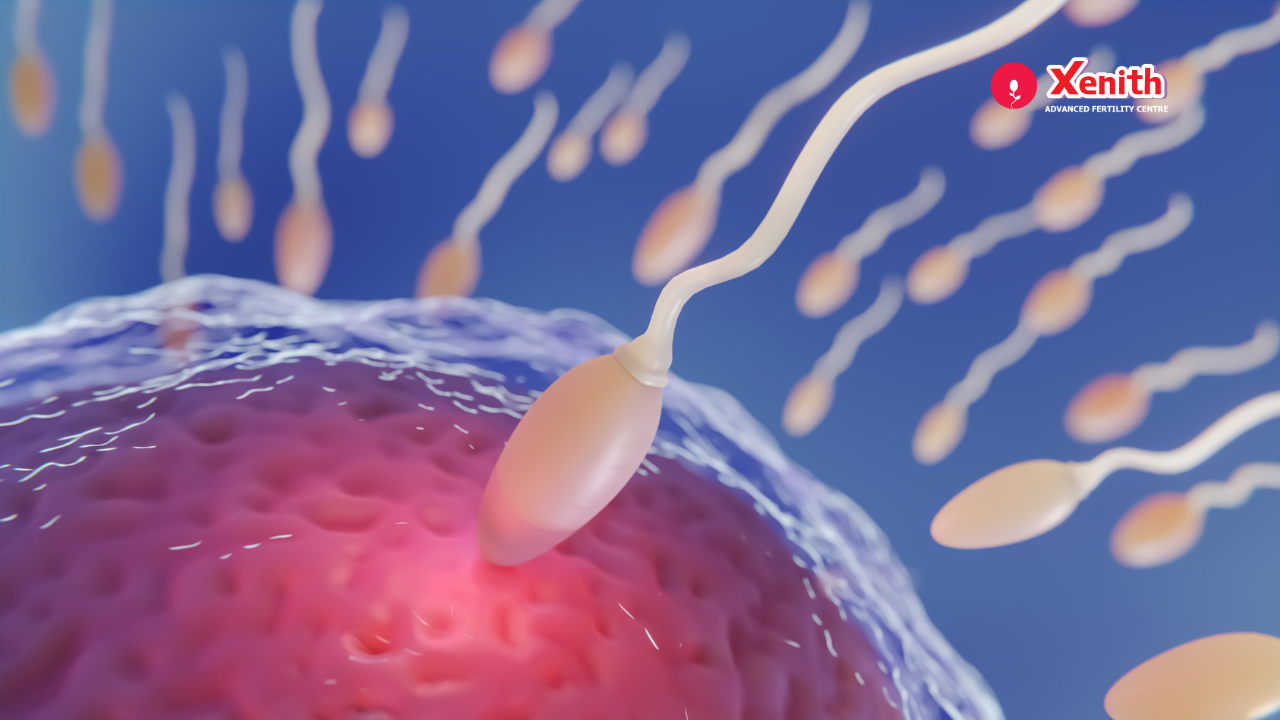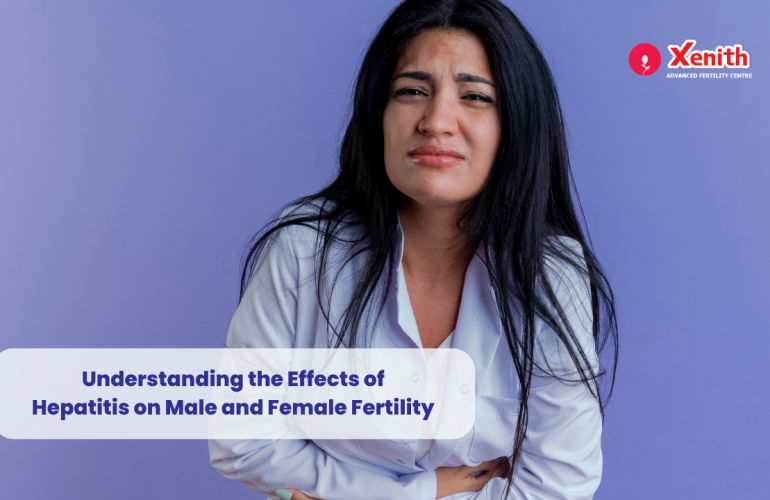Did you know that the human testicles normally produce millions of sperm every day? A sperm is a male reproductive cell with an oval head and a long tail that is produced in the testicle. It is mixed with semen and is ejaculated out. It fertilizes a female egg cell to form an embryo which develops to become a baby.

Free Thursday Consultation
Book Your AppointmentThe sperm is made up of 3 parts which are the head, the midpiece and the tail which is called the flagellum. The sperm head contains the DNA or the genetic material and it has 23 chromosomes which combine with the 23 chromosomes in the female egg to make up a total of 46 chromosomes of the human embryo. The tip of the sperm head has enzymes which can break down the protective layers of the egg’s surface in order to penetrate and fertilize it. The midsection contains the energy or the mitochondria for the sperm to be mobile. The tail propels and moves the sperm toward the egg.
Abnormal sperm
Various factors like age, lifestyle, genetics and medical conditions can affect the quality and quantity of sperm. Abnormalities in sperm can reduce the chances of successful conception leading to infertility. Semen analysis of the sperm looks at various things like its morphology or shape, volume of semen produced, total number of sperm, sperm concentration or the number of sperm per mL, its vitality or % that are alive, and its motility or how it moves. After testing all these parameters and getting a prognosis of having abnormal sperm doesn’t mean that you won’t be able to have children. Assisted reproductive technologies like in vitro fertilization are available to aid you.
There are different types of abnormalities of sperm.
- Aspermia- occurs when no semen is released upon ejaculation
- Hypospermia- where the volume of semen is low or less than 1.5mL
- Azoospermia– where ejaculated semen doesn’t have any sperm.
- Oligozoospermia- where the sperm count is low as well as there being issues with sperm shape and motility
- Asthenozoospermia- where many sperm don’t move at all or don’t move in a straight line and move abnormally. There also may be a low sperm count.
- Teratozoospermia- where most of the sperm are shaped abnormally or have a double head or tail. Thus they are not able to move properly.
- Oligoasthenoteratozoospermia (OAT)- where the shape, size and movement are abnormal There also may be lower numbers of sperm present.
- Necrozoospermia- where all the sperm in the semen are dead.
- Leukocytospermia- where there are many white blood cells present in the semen. White blood cells are often present to fight some infection.
Abnormalities in sperm could be due to:
- Low sperm count– means the ejaculated semen has fewer sperm than normal which is less than 15 million sperm per mL of semen.(1) This could decrease the chances of conception and it may take longer to conceive. Sometimes, there may be no sperm in the semen at all. Low sperm count could be due to chromosomal errors, blockage of sperm passage, hormonal imbalances, obesity, trauma in the area around the testicles, varicoceles (which is a bulging of the veins within the testicle) or due to taking certain medications.
- Poor sperm motility– would make it difficult for the sperm to swim towards the egg in order to fertilize it. Normally they should be moving forward in large circles(progressively motile), but decreased mobility might mean that they are moving in small circles and not forward (non progressively motile)or not moving at all(immobile). The cause could be genetic, due to injury, health issues, infection, lifestyle or environmental factors. Some lifestyle changes like stopping smoking, exercising, and maintaining a healthy weight could help resolve this issue. Poor sperm motility is diagnosed if less than 32% of the sperm are moving properly.(1) Symptoms might include swelling or pain in the testes, having issues with erection, and decreased sex drive.
- Abnormal sperm morphology – refers to the sperm’s shape, size and structure. A normal sperm would have a smooth, oval head, normal looking midpiece and tail. Abnormal sperm might have too large, too small, a misshapen head or no head at all. An abnormal tail could be coiled, crooked, have a stump, be of irregular thickness, have double, multiple tails or no tail at all. Abnormal sperm morphology could be caused by toxins, poor diet, exposure to heat, stress, or alcohol/ drug use. It could lead to infertility and increased chances of miscarriage. The DNA could also be damaged causing infertility, birth defects, miscarriages and it could be due to age, toxins in the environment, certain diseases or health problems..
- Sperm agglutination- occurs where sperm stick together and form clumps. It is measured by the percent of sperm stuck together in a sample. A higher amount of clumping causes more infertility issues because the mobility of clumped sperm could be impaired and make it difficult to fertilize the egg. It could be caused due to infection, trauma, presence of anti-sperm antibodies. Clumped sperm could be washed to remove the coating around it which makes it sticky and transferred back into the uterus to fertilize an egg in a procedure called intrauterine insemination (IUI). It could also be fertilized in a laboratory setting and the fertilized egg is transferred to the uterus in a procedure called in vitro fertilization(IVF).
- Semen volume- is less. WHO considers less than 1.5mL as abnormal. (1) This could be due to age, retrograde ejaculation where semen goes into your bladder rather than coming out of the penis. It could also occur due to injury, some medications, or certain diseases.
Symptoms
There may be no symptoms at all and it might only come to light when trying to conceive and having issues with infertility. Some might have problems maintaining an erection, losing hair due to hormonal imbalances or have swelling and pain in the testicle area. Other symptoms might include losing sex drive or having dry ejaculations, having blood in semen due to infections or previous surgery.
Treatment
Treatment for abnormal sperm would depend on the cause. Medications could be used to treat hormonal imbalances or infections. Assisted reproductive technologies like IUI or IVF could be used for successful conception. You also could change certain things in your lifestyle like eating a healthy diet, exercising regularly, getting enough sleep, staying hydrated, decreasing stress and stopping smoking. Avoid hot places like hot tubs and wear loose, breathable clothing because sperm don’t like heat. Surgery for treating varicoceles could help. If the sperm abnormality cannot be treated, donor sperm could also be an option. It is thus important to discuss various treatment options with your doctor.
Frequently Asked Questions
Q1. Can I still become a father if I have abnormal sperm?
It depends on the type and severity of the abnormality but due to advances in assisted reproductive technologies, procedures like IVF could make your dreams of becoming a father come true.
Q2. Is there anything I can do to fix the abnormal sperm?
New sperm are being produced constantly. As mentioned above you can follow a healthy lifestyle like eating healthy, exercising regularly, avoiding or learning to deal with stress, stop smoking or drinking excessively and also talk to the experts at Xenith Advanced Fertility Centre who can help improve your sperm quality and quantity to help you have a child. If you are struggling with infertility or think that you might have abnormal sperm, talk to the fertility experts at Xenith Advanced Fertility Centre who can listen carefully to all your concerns and do thorough testing to get to the root of the problem and help you successfully become a father.




